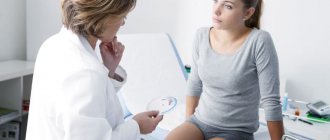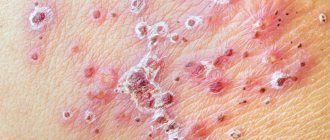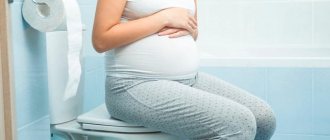Despite the fact that every second pregnant woman suffers from toxicosis, and many consider this normal, it is not the norm. Toxicosis is a change in the body of a pregnant woman, which most often manifests itself in the early stages as nausea and vomiting. And if it is not possible to completely get rid of toxicosis, then it is quite possible to reduce its manifestations.
Causes and manifestations of early toxicosis in pregnant women
Currently, there are several theories explaining the causes of toxicosis in early pregnancy. However, there is no clear answer to the question of why women suffer from toxicosis. According to one theory, during the period of bearing a child, a so-called “pregnancy center” is formed in the brain, which is responsible for the behavior and physiological functions of the pregnant woman’s body. Its work activates neighboring brain centers, which leads to increased salivation, dizziness, nausea and vomiting. Other reasons include:
- irritation of endometrial receptors;
- hormonal changes in the body;
- the reaction of the immune system, which perceives the fetus as a foreign object;
- psychogenic factors - anxiety before childbirth, fear for the unborn child.
Most often, early toxicosis begins to appear at 5-6 weeks of pregnancy. As a rule, women complain:
- for nausea and vomiting;
- lack of appetite;
- increased salivation;
- dizziness;
- change in taste preferences.
During a medical examination, doctors may detect a rapid heartbeat, low blood pressure, and slight weight loss.
With a mild degree of toxicosis, only some weakness and nausea may be observed, and with severe toxicosis, uncontrollable vomiting and associated dehydration and increased blood pressure, which can lead to intrauterine pathologies of the fetus and premature birth. In severe cases, you will not be able to escape from toxicosis on your own; inpatient treatment and constant monitoring by obstetricians and gynecologists is necessary.
Indications
Enterosgel is often used in gastroenterology, allergology, nephrology, obstetrics and gynecology, pediatrics, and toxicology as a treatment for conditions in which intoxication of the body is observed. Thus, the indications for use of Enterosgel are:
- chronic kidney diseases (including pyelonephritis, glomerulonephritis, polycystic kidney disease, azotemia);
- burn disease in the intoxication phase;
- purulent-septic pathology, accompanied by significant intoxication of the body;
- toxicosis during pregnancy;
- allergic diseases (allergic rhinitis, bronchial asthma, food allergies, acute or chronic urticaria);
- skin diseases (atopic dermatitis, acne vulgaris, eczema);
- ARVI;
- radiation injuries;
- acute/chronic diarrhea of any nature (including viral, bacterial, occurring due to food poisoning or after treatment with antibiotics, associated with chronic inflammatory bowel diseases, malabsorption syndrome, etc.);
- poisoning with toxic and potent substances, including drugs, alcohol, salts of heavy metals;
- acute and chronic poisoning of the body, including food poisoning;
- intestinal syndrome caused by allergic food intolerance;
- acute intestinal infections of any origin (viral, bacterial infections)
- for toxic-infectious liver damage (including viral hepatitis types A and B, toxic hepatitis);
- with cholestasis of various origins;
- with cirrhosis of the liver;
- with hypo- or hyperacid gastritis;
- for peptic ulcer of the duodenum and stomach;
- with enterocolitis;
- with ulcerative colitis;
- with irritable bowel syndrome;
- with post-resection syndrome;
- during the periods before and after operations on the gastrointestinal tract.
For people who do not suffer from gastrointestinal problems to one degree or another, Enterosgel can be prescribed for the prevention of ischemic heart disease, atherosclerosis, for chronic intoxication in those employed in hazardous work, living in environmentally unfavorable regions, as well as for preventive cleansing of the body.
Symptoms of toxicosis in late pregnancy
Late toxicosis is a serious complication of pregnancy. Women with late toxicosis need constant medical supervision, since there is a threat not only to the health of the pregnant woman, but also to the baby. Due to metabolic disorders, the placenta, which is the connecting link between mother and child, suffers. Its blood supply deteriorates, so the fetus does not receive the nutrients and oxygen it needs.
Excess water in the mother’s body creates a large load on the kidneys, which can lead to their failure, and in severe cases, to hemorrhage and swelling of the brain. With a mild degree, you can do without a hospital, the main thing is to regularly see a doctor. In severe cases, hospitalization is mandatory.
The main symptoms of late toxicosis:
- swelling;
- increased blood pressure;
- the appearance of protein in the urine;
- convulsions.
Slight swelling is observed in the later stages in most pregnant women, but widespread swelling throughout the body, including the face, indicates the appearance of dropsy - late toxicosis of the initial stage. In more severe cases, blood pressure increases and there is a risk of developing a convulsive syndrome. A pregnant woman with such symptoms must be admitted to a hospital under medical supervision.
Origins of the development of pathology
During pregnancy, hormonal changes occur in the female body. This is a natural process.
Modern science is not able to give an exact answer about the development of toxicosis. Each woman develops this disease individually. It all depends on the immunity and physiological characteristics of the pregnant woman’s body. High-quality therapy requires an individual approach.
The emerging fetus produces waste products and produces toxins. The disease is not terrible and you should not be afraid of it. The task of the expectant mother is to alleviate her situation in the possible ways.
Additional reasons for the development of toxicosis:
- growth of the placenta;
- protecting the body from the effects of an actively growing fetus;
- presence of chronic diseases;
- unstable psychological state of the pregnant woman;
- genetic predisposition;
- pregnancy with multiple fetuses;
- great age of the pregnant woman.
The development of toxicosis is accompanied by a considerable number of factors. It is difficult to independently try to determine the source of the problem and how to influence it. Specialists of JSC “Medicine” (clinic of academician Roitberg) will help a woman get rid of feelings of discomfort and turn the initial stage of pregnancy into pleasure.
How to deal with toxicosis using folk remedies?
Let us immediately make a reservation that it is possible to fight toxicosis with folk remedies only in mild cases. If symptoms are severe and severe, medical attention is required. The following tips will help alleviate toxicosis in early pregnancy:
- When you wake up, do not jump out of bed immediately. Lie down for a while, and only then get up, slowly without sudden movements.
- Sour or salty foods sometimes help with nausea. You can suck a slice of lemon or eat a lightly salted cucumber.
- One of the popular methods to combat nausea is water with honey and apple cider vinegar. Add one teaspoon of food to a glass of water and place it next to your bed before going to bed. When you wake up, drink a drink. Please note that this recipe has limitations. It is contraindicated in women with diabetes, excess weight, liver and gallbladder diseases.
- Mint also helps to cope with early toxicosis. To quickly relieve an attack of nausea, carry mint candies with you in your purse, and brew tea at home with the addition of mint leaves.
In case of late toxicosis, to reduce swelling, it is recommended to reduce salt intake and control the amount of fluid. Two liters per day will be enough.
If none of the tips helps cope with toxicosis, you should visit a doctor.
Contraindications
Even though Enterosgel does not penetrate the systemic bloodstream and does not stick to the walls of the digestive canal, it has a number of contraindications:
- peptic ulcer of the duodenum or stomach in the acute stage;
- morphophysiological disorders in the gastrointestinal tract of various types (intestinal atony, acute gastric dilatation syndrome, etc.);
- hypersensitivity to Enterosgel components;
- bleeding from the gastrointestinal tract.
Side effects
Enterosgel is well tolerated, but this does not eliminate the possible occurrence of adverse reactions. Thus, taking the drug can cause nausea, periodic vomiting, and in the first days there is a possibility of developing constipation. In case of functional renal or liver failure, a feeling of aversion to the drug may occur.
Nutrition for toxicosis
It is dangerous for a pregnant woman to starve, since the development of the fetus depends on her nutrition. However, constant nausea often becomes the reason for refusing to eat. And even if there is no appetite at all, you still need to eat.
Eat small meals five to six times a day. Overeating will only make your nausea worse. Your daily diet must include foods rich in protein: meat, fish, nuts, milk. Protein is a building material that is necessary for the harmonious development and growth of the baby.
Vitamin B6 will help improve your well-being in the early stages of pregnancy. It has been clinically proven that its use reduces the manifestations of early toxicosis. In addition, vitamin B6 helps the body better absorb proteins and amino acids, thereby reducing the severity of nausea and vomiting. Therefore, during pregnancy it is necessary to take vitamin and mineral complexes, which include vitamin B6.
The vitamin and mineral complex Pregnoton Mama contains vitamin B6, as well as other equally important vitamins, macro- and microelements. Daily intake of one capsule of Pregnoton Mom at the stage of preparation for conception will prevent the development of early toxicosis, and in the early stages of pregnancy will help reduce the severity of symptoms and improve the condition of the pregnant woman.
Toxicosis in pregnant women is an unpleasant phenomenon that darkens the joy of expecting a child. The main thing is not to let the situation take its course. Be sure to tell your doctor about your illness, follow all advice and recommendations, and also take vitamin and mineral complexes. Remember, toxicosis is not forever, it will pass and there will be no trace of bad health left.
THIS IS NOT AN ADVERTISING. THE MATERIAL WAS PREPARED WITH THE PARTICIPATION OF EXPERTS.
How to take Enterosgel
Enterosgel in any dosage form is taken orally 2 hours before meals or medications, or 2 hours after.
Enterosgel paste is completely ready for use. It should be taken with enough water. But an aqueous suspension is made from Enterosgel in gel form before taking it. To do this, the required amount of gel is ground in a quarter glass of water, then taken with water.
Enterosgel paste is washed down with water.
Therapeutic course:
On average, the duration of the therapeutic course is 7-14 days. To prevent chronic intoxication, it is necessary to take 22.5 g (1 packet) 2 times a day for 7-10 days monthly. If the intoxication is pronounced, then the doctor may decide to double the dose in the first 3 days of therapy. After stabilization of the condition, they switch to the average therapeutic dosage. After the symptoms of acute intoxication or intestinal infection disappear, the drug is used for several more days.
For obstructive jaundice and liver cirrhosis, it may be prescribed for a longer period of time (2 months or more).
Repeating the course of treatment is permissible only after the recommendation of the attending physician.
Thus, the instructions for use of Enterosgel give the following dosages:
The daily dose (45 g for adults and 30 g for children) is divided into 3 doses. The duration of treatment is determined individually and depends on the severity of the disease and the age of the patient.
- single dosage – 1 tablespoon (15 g) – for adults;
- children under 3 years old – 1 teaspoon (5 g) 2 times a day (daily dose – 10 g);
- children 3-5 years old – 1 teaspoon 3 times a day (daily dose – 15 g);
- children 5-14 years old - 1 dessert spoon (10 g) 3 times a day (daily dose - 30 g).
Prevention:
For preventive purposes, adult patients are prescribed the following dosage regimen:
- prevention of ischemic heart disease and atherosclerosis - 1-1.5 months three times a day, 1 packet;
- prevention of chronic poisoning of the body - 7-10 days, twice a day, 1 packet;
- body cleansing - 10-14 days, three times a day, 1 packet (the cleansing course is repeated 3 to 6 times during the year).
For diarrhea:
You should immediately take 2 standard single doses of Enterosgel. In the future, the drug is taken 1 standard dose after each bowel movement. After the stool returns to normal, the drug is taken in an age-appropriate dosage for another 5 days.
It is important to remember that diarrhea cannot be treated with sorbent alone. It is necessary to find out the source of the disease and begin comprehensive drug treatment. After all, diarrhea can be infectious or non-infectious. A doctor can determine the cause of diarrhea.
When vomiting:
Enterosgel is taken when vomiting, as it usually indicates intoxication of the body. In case of acute poisoning, the dose of Enterosgel can be doubled for the first three days. After this, you should take the standard therapeutic dosage - 1 packet or 1.5 tbsp. spoons 3 times/day. On average, in case of poisoning, the therapeutic course lasts 10 days. The drug must be taken immediately after vomiting has stopped. If there is a series of attacks, then in the interval between them. It is worth noting that Enterosgel is contraindicated if the cause of poisoning is caustic substances (acids or alkalis), some solvents (for example, ethylene glycol or methanol), or cyanides.
Important! For diseases that are accompanied by fluid loss (vomiting, diarrhea), the use of Enterosgel should be supplemented with rehydration solutions that replenish the deficiency of electrolytes. This is necessary to avoid dehydration and subsequent complications. To replenish the volume of lost fluid and electrolytes, you should purchase specialized drugs at the pharmacy: Regidron, Trisol, Gidrovit, Reosolan, Gastrolit, Humana Electrolyte, etc.
Your doctor will help you choose the required dosage and frequency of administration.
Risks of complications
The effect of toxicosis on a pregnant woman’s body depends on the degree of development of the disease. The first degree is harmless to the woman’s body and occurs naturally. In some cases, the second degree does not pose a threat. In a normal course, by 14 weeks the symptoms disappear.
The third degree is dangerous for the health of the woman and the fetus. The body becomes dehydrated and exhausted. Women are at risk of developing complications:
- heart and kidney failure;
- pulmonary edema;
- falling into a coma due to exhaustion;
- placental insufficiency in late stages of pregnancy;
- delay in fetal development;
- risk of premature birth.
Toxicosis in pregnant women is not always mild. The health of the fetus is in the hands of the mother and father. As symptoms of the disease develop, the risk of complications increases proportionally.
Treatment methods
Severe manifestations of the disease require specialized medications. Self-medication can be harmful, so you should definitely consult with specialists from JSC “Medicine” (clinic of academician Roitberg). This way there will be no risk of harm to the fetus.
Treatment principles:
- mild form does not require treatment. It all comes down to observation;
- elimination of vomiting;
- choleretic drugs relieve symptoms and improve liver function;
- other prescribed medications will help get rid of muscle spasms, eliminate abdominal pain, lower blood pressure and overcome general weakness.
Medications are prescribed by qualified doctors based on test results. Conclusions and treatment based on them that are not supported by research are dangerous to health.
Preventive measures
Prevention measures are aimed at preventing the occurrence of side effects of toxicosis. It is important for a young mother to control herself throughout the day.
Useful tricks:
- absence of sudden movements, especially in the morning;
- split meals with lots of snacks;
- cumin or regular chewing gum prevents vomiting;
- high intake of vitamin B6 contributes to the absence of vomiting4
- only light food in the diet;
- drinking large volumes of liquid per day in small portions;
- drinking mint decoctions.
Prevention will improve your well-being. The phenomena of toxicosis, if the daily routine is followed, will practically not disturb the young mother.
Visit or doctor's visit: preparatory activities
Poor health, constant low blood pressure and vomiting require preparation before visiting the medical center on your own. You should relax before going to the hospital.
Loved ones need:
- make an appointment for the pregnant woman in advance;
- organize delivery in the most comfortable conditions by car or taxi in the shortest possible time;
- promptly pick up the pregnant woman from the clinic.
If acute problems arise, you should wait until the doctor comes to your home. Ambulance is an effective measure in the fight against toxicosis, since the patient may be unable to move independently.











